Did you know over 200,000 homes face foreclosure each year in the U.S.? Buying foreclosures presents a big chance for smart real estate investors and buyers to find foreclosure homes, bank-owned properties, and other distressed real estate at lower prices. But is buying a home at a foreclosure auction right for you? Let’s look at the good and bad sides to help you decide.
Key Takeaways
- Foreclosure auctions offer the potential for significant discounts on investment properties and fixer-uppers
- Understanding the foreclosure auction process, including property research and financing, is crucial to making a successful bid
- Buying a foreclosure property carries inherent risks, such as liens and encumbrances, and may require extensive renovations
- Alternatives like pre-foreclosure opportunities and short sales can provide similar discounts with less risk
- Working with experienced real estate professionals can help navigate the complexities of foreclosure purchases
Understanding Foreclosure Auctions
Foreclosure auctions are key in the real estate world. They offer buyers a chance to get properties at lower prices. These happen when a homeowner misses mortgage payments, and the lender takes over the property.
What is a Foreclosure Auction?
A foreclosure auction is when a bank sells a property it took back. Buyers can bid on these properties, with the highest bidder winning. These auctions can be in person or online, depending on local rules.
Types of Foreclosure Auctions
- Courthouse Steps Auctions: These happen on courthouse steps, where the highest bidder wins.
- Online Foreclosure Auctions: Now, many auctions happen online, making it easier for buyers to participate.
- REO (Real Estate Owned) Auctions: If a property doesn’t sell at auction, the lender owns it. These are then sold through REO auctions.
| Auction Type | Location | Advantages | Challenges |
|---|---|---|---|
| Courthouse Steps Auctions | Local Courthouse |
|
|
| Online Foreclosure Auctions | Virtual Platform |
|
|
| REO Auctions | Specialized Platforms |
|
|
Knowing about the different foreclosure auctions is key for buyers. It helps them find foreclosed properties at good prices.
Advantages of Buying Foreclosures
Potential for Significant Discounts
Buying foreclosed properties can lead to big savings. These homes are often priced lower than the market value. This is a great chance for first-time buyers or those looking for fixer-uppers and investment properties.
Discounts on foreclosed homes can be huge, sometimes up to 50% off. Lenders, like banks, want to sell these properties fast. They might accept lower offers to sell quickly.
| Type of Property | Average Discount |
|---|---|
| Foreclosed Single-Family Homes | 15-30% off market value |
| Foreclosed Condos/Townhouses | 20-40% off market value |
| Foreclosed Investment Properties | 25-50% off market value |
These big potential discounts make foreclosed properties appealing. Buyers need to be ready to work hard and fix any property issues.
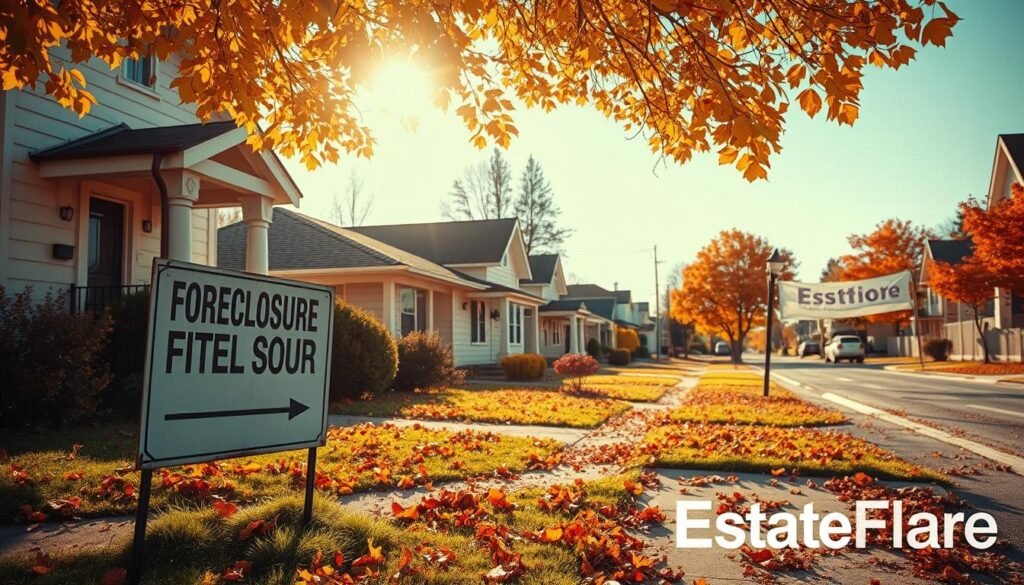
“Buying a foreclosed property can be a smart financial move, but it’s essential to do your due diligence and understand the risks involved.”
Risks Involved with Buying Foreclosures
Buying a foreclosed property can be tempting, with the chance to save a lot of money. But, it also comes with risks that buyers need to think about. Two big challenges are not being able to fully inspect the property and the chance of liens or encumbrances.
Lack of Property Inspections
One major risk of foreclosures is not being able to fully check the property before buying. In regular home buying, buyers can hire inspectors to find problems and negotiate. But, with foreclosures, this isn’t possible because they are sold “as-is.”
This means buyers might find surprises like structural problems or hidden dangers. They need to be ready for these surprises and plan for the costs of fixing the property.
Potential for Liens and Encumbrances
Another big risk is the chance of liens and encumbrances on the property. When a homeowner can’t pay their mortgage, the lender puts a lien on the property. This can include unpaid taxes or utility bills, and they can stay on the property after it’s sold.
Buyers need to check the property’s history and do title searches to find any liens. Not dealing with these can lead to expensive legal fights and financial problems.
Dealing with the risks of buying foreclosures needs careful research and understanding. By thinking about these challenges, buyers can make smart choices. This way, they can avoid big problems and have a successful foreclosure purchase.
Preparing for a Foreclosure Auction
Getting ready for a foreclosure auction is all about preparation. You need to research properties and get your finances in order. These steps are crucial before you start bidding.
Researching Foreclosure Properties
Start by researching the properties up for auction. Look into their location, size, and condition. Also, check for any liens or debts on the property. This research helps you decide which properties are worth bidding on.
- Get property records and history to understand the home’s background.
- Try to inspect the property to see its condition and any issues.
- Talk to local real estate experts to learn about the area and market trends.
Securing Financing for Foreclosures
Getting the right financing is key. You need money to bid and buy the property. Look into different financing options, like mortgages or investor loans, to be ready for the auction.
- Get prequalified for a mortgage or get a pre-approval.
- Look into special financing for foreclosures, like hard money loans.
- Make sure you have enough money for the down payment and other costs.
By researching properties and getting your finances in order, you boost your chances at the auction. This preparation is vital for making smart choices and competing in the bidding.
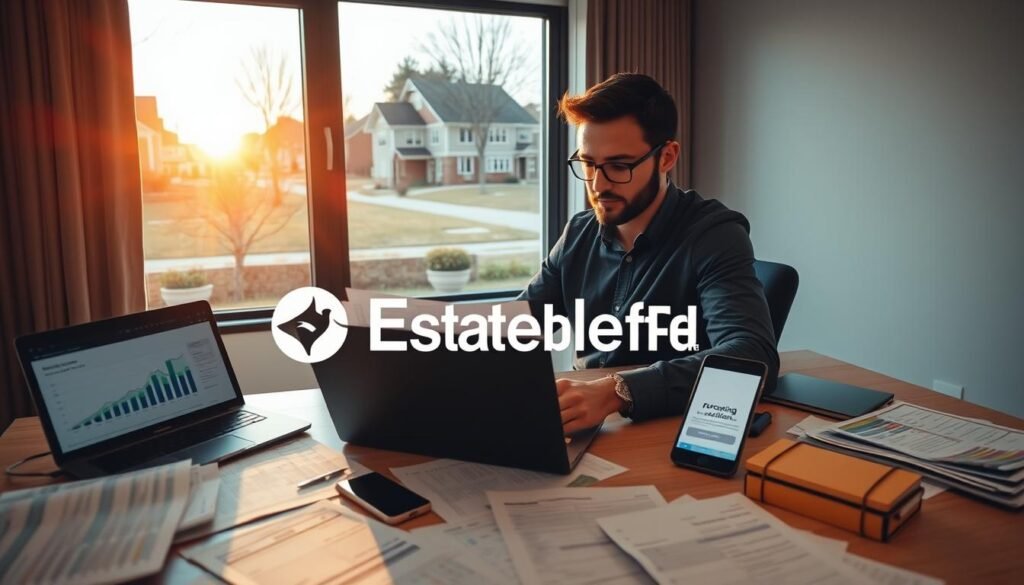
| Key Considerations When Researching Foreclosure Properties | Financing Options for Foreclosure Auctions |
|---|---|
|
|
“Preparation is the key to success at a foreclosure auction. Thorough research and securing the right financing can make all the difference in securing a profitable property.”
The Foreclosure Auction Process
Exploring the foreclosure auction process can be both challenging and rewarding for real estate investors. It’s key to grasp the different steps involved in the auction process before bidding on a foreclosure property.
First, the foreclosure auction is usually announced through public notices. These notices provide essential details like the property’s information, auction date, and starting bid. Buyers need to do their homework on the property. This includes checking property records, inspecting the property (if possible), and looking into any liens or encumbrances.
On the auction day, the auctioneer starts the bidding. Bidders compete to win the property. It’s vital to have your financing ready and be ready to act fast, as the bidding can go quickly.
After winning the bid, the buyer has a set time, usually 30 to 45 days, to complete the purchase. This involves finalizing paperwork, transferring the property title, and paying any outstanding taxes or fees.
| Stage | Description |
|---|---|
| Announcement | Public notice of the foreclosure auction, including property details and opening bid price. |
| Research | Thorough investigation of the property’s condition, liens, and encumbrances. |
| Bidding | Competitive auction process with buyers vying for the property. |
| Purchase | Completion of the sale, including title transfer and payment of any outstanding fees. |
Knowing the foreclosure auction process is crucial for real estate investors. By understanding the different stages and legal aspects, investors can make smart choices. This can lead to securing valuable properties at lower prices.
Post-Auction Considerations
Buying a foreclosed property is just the beginning. After the auction, there are many important things to think about. You’ll need to handle existing occupants, plan for renovations, and make repairs. These steps are crucial for a smooth transition into your new home.
Handling Existing Occupants
Dealing with current occupants is a big part of post-auction tasks. This could be the former homeowners or renters. Knowing your rights and responsibilities is key, as laws differ by area. Getting help from a real estate lawyer can make this process easier and legal.
Renovations and Repairs
Foreclosed homes often need a lot of work. They might have been ignored or damaged during the foreclosure. A thorough check before the auction can help you figure out what needs to be done. Having a clear plan and budget for repairs can help manage the process.
| Post-Auction Consideration | Key Factors to Address |
|---|---|
| Existing Occupants |
|
| Renovations and Repairs |
|
By tackling these post-auction tasks early, we can make the transition into our new home smoother. This sets the stage for a successful investment.
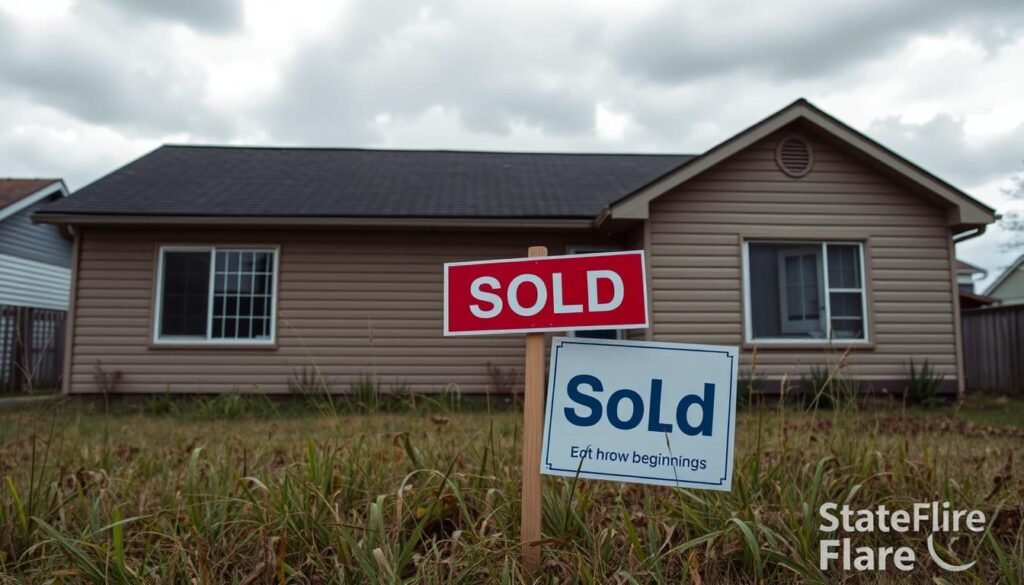
Buying Foreclosures
Buying foreclosure properties is a great chance for both new and experienced investors. It’s a way to find valuable properties at lower prices. Knowing how to buy foreclosures can help you get a good deal.
When buying foreclosures, making a strong bid at auction is crucial. You need to know the property’s condition, any debts, and its market value. This research helps you avoid overpaying or getting a property that needs a lot of work.
After winning the auction, you must finalize the sale and take the property. This involves dealing with legal and financial issues, like clearing debts and handling current residents. Having real estate experts help can make this easier.
For those looking to buy foreclosure properties as part of their real estate investing plan, there’s a big chance for savings. By studying the market and the property, you can find great deals to grow your portfolio.
| Key Steps in Buying Foreclosures | Considerations |
|---|---|
|
|
“Buying foreclosures can be a strategic way to acquire investment properties at a significant discount, but it requires careful planning and a thorough understanding of the process.”
Alternatives to Foreclosure Auctions
Foreclosure auctions are not the only way to buy distressed properties. We’ll look at other options like pre-foreclosure opportunities and short sales. These alternatives can offer discounts and investment chances without the auction risks.
Pre-Foreclosure Opportunities
Buying properties before they go to auction is another option. Homeowners facing foreclosure might look for ways out, like short sales or loan changes. This lets buyers negotiate with the owner, often leading to big discounts.
Short Sales
Short sales are when a home is sold for less than the mortgage. They need lender approval but can save buyers a lot. For homeowners, short sales can help avoid foreclosure’s credit hit.
| Alternative | Potential Benefits | Key Considerations |
|---|---|---|
| Pre-Foreclosure Opportunities |
|
|
| Short Sales |
|
|
Looking into pre-foreclosure opportunities and short sales can be a smart move. These paths offer benefits similar to auctions but with less risk. By carefully choosing, investors can find the best way to buy distressed properties and grow their investments.
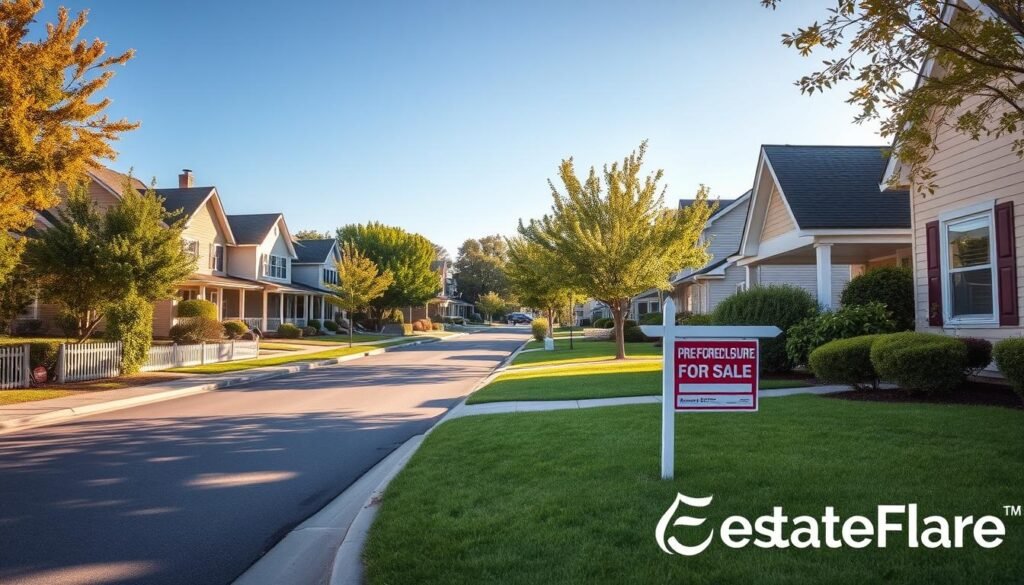
“Exploring alternatives to foreclosure auctions can open up new avenues for acquiring distressed properties and achieving your investment goals.”
Legal and Tax Implications
Buying a foreclosed property is more than just a good deal. It also comes with legal and tax issues. We need to know the local laws and regulations for these deals.
Understanding Local Laws
Foreclosure laws differ a lot from place to place. Important things to think about include:
- Foreclosure rules and timeframes in your area
- Possible hidden liens or issues that could affect ownership
- Rules for dealing with current tenants or homeowners
Knowing these laws can help us avoid big problems and make the buying process easier.
Tax Implications
Buying a foreclosed property also means dealing with taxes. This includes:
- Property taxes and any unpaid taxes
- Taxes on selling the property
- Tax breaks or deductions for buyers
Understanding these tax and legal issues early on helps us make smart choices. This way, we can protect our investment.
Dealing with the legal and tax side of buying a foreclosed property can be tricky. But with the right knowledge and help, we can buy a foreclosed property successfully. By staying informed and working with experts, we can make sure our purchase goes smoothly.
Working with Real Estate Professionals
Dealing with foreclosure auctions can be tough. But, working with experienced real estate pros can be a big help. Agents, attorneys, and experts in foreclosures can guide you through it all.
These real estate professionals know the foreclosure market inside out. They understand the laws and the investment potential of these properties. Their knowledge is key for foreclosure experts and those looking for investment property guidance to:
- Understand the legal and regulatory sides of foreclosures
- Find properties with the best investment chances
- Check a property’s condition and estimate renovation costs
- Get financing and handle the bidding at foreclosure auctions
- Manage the property after buying it
With the help of these real estate professionals, you can find a profitable foreclosure. And you can go through the process with more confidence.
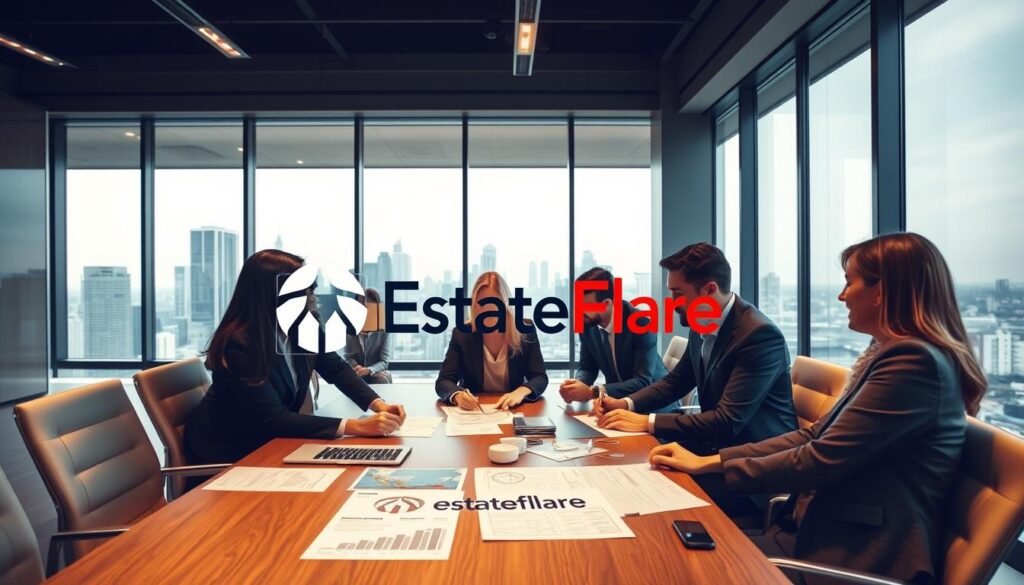
“Partnering with experts who understand the intricacies of the foreclosure market can be a game-changer for investors looking to capitalize on these unique opportunities.”
Whether you’re an experienced investor or a first-time buyer, working with real estate professionals is important. They specialize in foreclosure experts and investment property guidance. This step is crucial in your journey to buy a foreclosure property.
Financing Options for Foreclosures
Getting the right financing is key when buying a foreclosed property. We’ll look at different financing options, like traditional mortgages and special investor loans. We’ll cover what makes each option unique to help you choose the best one for you.
Conventional Mortgages
Conventional mortgages are the most common choice for buying foreclosures. You can get these loans from banks, credit unions, or mortgage lenders. To qualify, you need to meet certain credit score, income, and debt-to-income ratio standards.
Investor Loans
Investors might choose specialized investor loans for foreclosures. These loans have their own rules and terms, designed for real estate investors. They might ask for a bigger down payment and have higher interest rates. But, they offer more flexibility and can help investors buy foreclosure properties.
It’s vital to know the details of each financing option, no matter which one you pick. By understanding the requirements, terms, and risks, you can make a choice that fits your investment goals and financial situation.
“Careful planning and research are crucial when securing financing for a foreclosed property. Understanding the unique requirements and risks of each financing option can help you make the most informed decision.”
Evaluating Foreclosure Investment Potential
Investing in foreclosed properties requires careful evaluation. It’s important to analyze the local rental market. This helps estimate rental income and check if the investment is profitable. It also helps find the best properties and set the right price.
Analyzing Rental Markets
Knowing the local rental market is key for investors. It’s wise to research average rental rates, how often properties are rented, and what types of properties are in demand. This info helps predict rental income and the return on investment.
- Gather data on average rents for similar properties in the neighborhood
- Analyze occupancy rates and trends to gauge tenant demand
- Identify the most sought-after property types and sizes in the local market
By studying the rental market, investors can choose the best foreclosure properties. They can also decide on the right purchase price.
| Metric | Average | Trend |
|---|---|---|
| Average Rent (2-bedroom apartment) | $1,500 | Increasing |
| Occupancy Rate | 92% | Stable |
| Demand for 3-bedroom homes | High | Growing |
The table shows important details about the rental market. It helps investors evaluate the investment potential of foreclosure properties. It guides them in making smart decisions about buying and renting.
“Thorough rental market analysis is essential for evaluating the investment potential of any foreclosure property. It allows you to accurately estimate potential rental income and make informed decisions about the right purchase price.”
Flipping Foreclosure Properties
Flipping foreclosure properties is a common strategy for real estate investors. It involves buying a foreclosed home, fixing it up, and then selling it for a profit. Investors can make a lot of money by buying these properties at a low price.
One big plus of flipping foreclosures is the chance to buy at a discount. These homes are sold for much less than their worth. This lets investors buy low and sell high after making repairs and improvements.
- Do your homework to find foreclosures that are a good deal.
- Get the right loan to buy and fix up the property.
- Check the property’s condition and plan how to improve it.
- Fix up the property quickly and affordably.
- Have a good plan to market and sell the property for the best price.
Flipping foreclosures can be very profitable, but it comes with risks. You might find hidden problems, liens, or unexpected costs. Doing your homework and planning carefully can help avoid these issues.
| Advantages of Flipping Foreclosure Properties | Potential Risks |
|---|---|
| Discounted property prices | Hidden property defects |
| Opportunity for substantial returns | Outstanding liens or encumbrances |
| Ability to add value through renovations | Unexpected renovation costs |
Flipping foreclosures can be a great way to make money in real estate. But, it’s important to be careful and do your homework. With the right plan and attention to detail, you can make a lot of money.
“The key to successful flipping of foreclosure properties is to find the right balance between risk and reward, and to execute the process with meticulous attention to detail.”
Avoiding Foreclosure Scams
Buying foreclosures can be rewarding, but we must watch out for scams. These scams target homeowners in trouble, using tricks to steal their property or money. Knowing about common frauds helps us protect ourselves and our investments.
Common Foreclosure Scams
One scam is phony foreclosure auction listings. Scammers make fake listings to trick buyers. Another scam is deed theft, where thieves forge documents to take a property without the owner’s knowledge.
- Phantom help scams: Scammers pretend to help with foreclosure, but steal personal info or money.
- Bait-and-switch schemes: Scammers promise help, then trick homeowners into losing their property rights.
- Bail-out schemes: Scammers convince homeowners to give up their deed, promising to save the home, but don’t make payments.
To avoid these foreclosure scams, do your homework, get advice from trusted experts, and be cautious of unsolicited offers. Anything that seems too good to be true probably is.
| Scam Type | Description | Potential Consequences |
|---|---|---|
| Phony Auction Listings | Scammers create fake foreclosure auction listings to lure buyers. | Financial loss and wasted time for buyers. |
| Deed Theft | Criminals forge documents to transfer property ownership without the homeowner’s knowledge. | Homeowners lose their property and face significant financial and legal challenges. |
| Phantom Help Scams | Scammers offer to assist homeowners with the foreclosure process, but instead steal their personal information or money. | Homeowners suffer financial loss and identity theft. |
| Bait-and-Switch Schemes | Scammers lure homeowners with false promises of help, then manipulate them into signing away their property rights. | Homeowners lose their property and face significant financial and legal consequences. |
| Bail-Out Schemes | Scammers convince homeowners to sign over the deed to their property, claiming they can save the home from foreclosure, but then fail to make any payments. | Homeowners lose their property and face the risk of foreclosure. |
By staying alert and taking action, we can avoid foreclosure scams and safeguard our investments or homes. Getting advice from trusted professionals and reporting any suspicious activities helps us safely go through the foreclosure process.
“Don’t let foreclosure scams rob you of your home or your hard-earned money. Stay informed and take the necessary steps to protect yourself.”
Selling a house or apartment without an agent: 15 useful tips
SELLING A HOUSE OR APARTMENT WITHOUT AN AGENT: 15 USEFUL TIPS
Conclusion
We’ve looked into the world of foreclosure auctions, finding both the good and the bad. We’ve explained how the auction process works, the pros and cons, and what you need to do to get started. This gives you a full picture of this exciting market.
If you’re looking for a great deal on a home or want to grow your real estate portfolio, foreclosure auctions are worth exploring. We’ve stressed the need for careful research, solid financing, and the help of seasoned real estate experts. This ensures you make smart choices that fit your investment plans.
Thinking about diving into real estate or buying a home? Go back and read the important points from this article. By staying up-to-date, managing risks, and using the chances that foreclosure auctions offer, you can make the most of this market. With the right plan and effort, buying a foreclosure can be a rewarding and life-changing experience.



